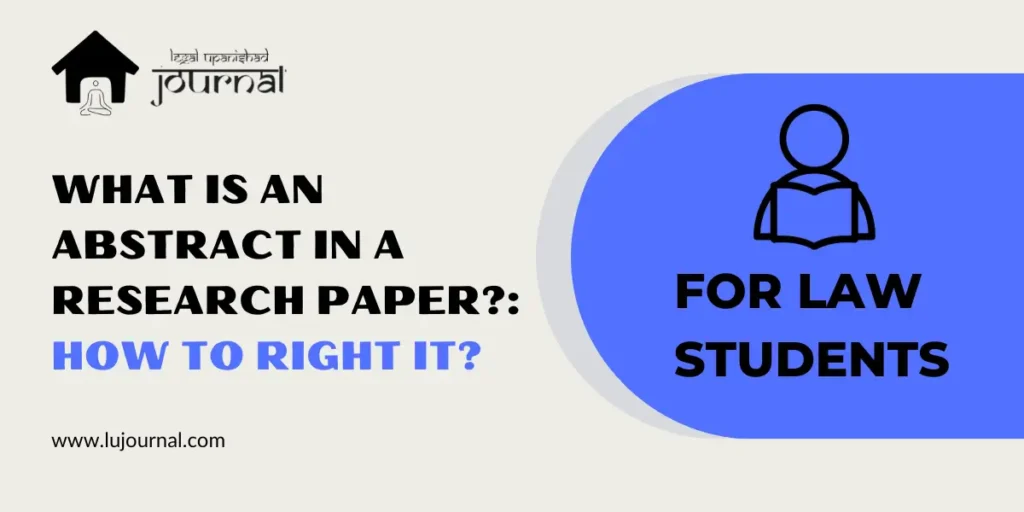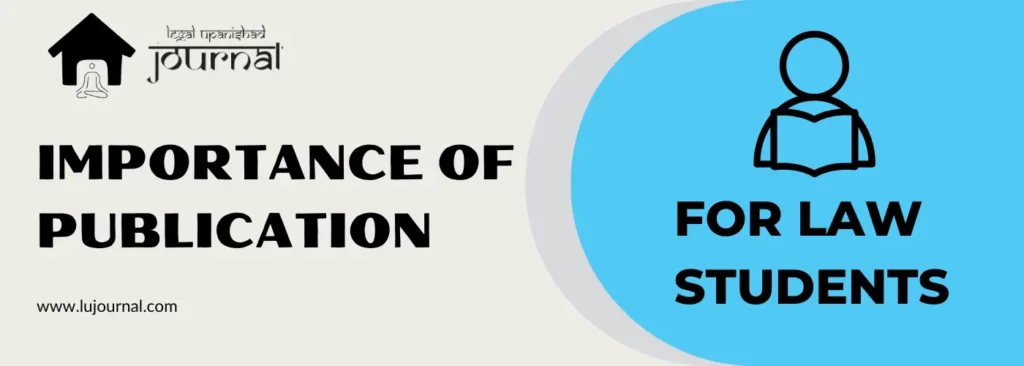This article on ”What is an Abstract in a Research Paper and How to write it?’ is a guide for law students.
Have confidence in your work and submit now – your ideas deserve to be read! Do Check the Submission Guidelines before submitting.
Table of Contents
Introduction
Research papers are a fundamental component of the academic world. They serve as vehicles for scholars to communicate their findings, insights, and discoveries with the broader scientific community. However, mentioned at the very beginning of these papers, often overlooked yet incredibly important, is the abstract.
This brief section, typically only a few hundred words long, plays a critical role in shaping the reader’s perception of the research paper and is a key to understanding its significance. In this article, we will explore the importance of the abstract in a research paper, its functions, and common errors in Abstract writing by researchers.
What is an Abstract?
When delving into the field of academic research, one comes across several parts, one of which is the abstract, which is a concise yet crucial component. An abstract is a brief synopsis that gives readers a rapid summary of your essay or report and its structure. It functions as a trailer for the full-length feature film that is your research work.
The Function of an Abstract
Before getting into the complexities of creating an abstract, let us first define its fundamental purpose. An abstract is intended to describe your paper rather than evaluate or defend it. It captures the core of your research and provides a glimpse of its main points. To accomplish this, it should handle the following elements:
- The issue or problem: Start with a short but comprehensive summary of the topic or issue addressed by your research. This establishes the context for your readers.
- Methodology and Design: Describe the approach and design that you used in your study. This informs readers about how you conducted your study.
- Important Findings: Highlight the major conclusions, findings, or arguments presented in your paper. This is the essence of your research, so make it as precise and simple as possible.
- Conclusions Reached: Summarize the inferences you’ve derived from your research. What are the most important takeaways or implications?
- Context and Importance: Describe the larger context in which your research is positioned. Describe the significance of your work and how it advances our understanding.
- Central problems: Clearly state the main issues or problems that your research tries to answer. Specify the knowledge gap or issue you are addressing.
By using these, you can provide readers with a thorough overview of your paper without making them read the whole thing. Citations belong in the main body of your paper; avoid including them in the abstract.
Common Errors in Abstract Writing by Researchers
The abstract, which is frequently left until the last minute during the writing process, is crucial to your research paper. It acts as a starting point, a persuading glimpse into the rich fabric of your writing. But what traps can you stay away from to prevent your abstract from unintentionally becoming a barrier for your readers?
- Lack of a Clearly Stated Rationale:
Failure to clearly convey the relevance of your study and its contribution to the area is one of the most serious mistakes you can make when writing an abstract. Readers should be able to identify the particular problem being studied in the first few phrases of your abstract and understand why it justifies further investigation. The absence of this crucial component, also known as the “rationale,” can cause the entire abstract to collapse.
- Incorrect Use of Tense:
Since they are frequently the final component of your academic paper, abstracts are best written in the past tense. This is a logical decision. Your objective now is to condense your study into a brief 200–250 word limit once all the hard work has been done.
Writing abstracts in the present tense can seem strange since it goes against their primary function of providing a summary of observations and analysis that may span years or even decades. Underscoring the significance of careful attention to detail, some academic institutions and review boards might even reject papers with abstracts composed in the wrong tense.
- Unnecessary Hyperbole and Jargon:
Using a lot of exaggerated language and passionate adjectives can make your conclusions seem unprofessional or biassed to readers, which will hurt the credibility of your research. Contrarily, readers may become disillusioned with an abstract if it is filled with obscure technical jargon and difficult calculations. As the abstract is frequently the reader’s initial introduction to your paper, refrain from using too many acronyms, especially if they haven’t been used before.
- Not Arriving At a Conclusion:
Consider your abstract to be a nicely wrapped package that contains the entirety of your research paper. One of the most frequent and serious mistakes committed by academics is leaving out a clear conclusion. An abstract should include the rationale, the results, and the main conclusions.
- Insufficient Use of Keywords:
The visibility of your work on search engines may suffer from a lack of keywords in the abstract. Strategically choose and use the most relevant keywords from the research paper throughout your abstract to improve discoverability.
These typical mistakes might seem insignificant, yet they have a big effect on how effective your abstract is. Avoiding these mistakes and writing a clear, short abstract can help guarantee that your research gets the attention and credit it deserves.
Conclusion
Abstracts shine as the guiding light in the complex world of academic research, wherein the sharing of knowledge depends on accuracy and clarity. These condensed summaries capture the core of a research paper and act as the starting point for readers to engage in further research.
In this post, we’ve examined the subtleties of abstracts, explaining what they’re all about and how to become a master at creating them.
References
- Shona McCombes, ‘How to Write an Abstract | Steps & Examples’, Scribbr, 28 February 2019, available at: https://www.scribbr.com/dissertation/abstract/
- ‘Writing an abstract’, University of Melbourne, available at: https://services.unimelb.edu.au/__data/assets/pdf_file/0007/471274/Writing_an_Abstract_Update_051112.pdf
- Shrutika Sirisilla, ‘Role of an Abstract in Research Paper With Examples’, Enago, 25 July 2023, available at: https://www.enago.com/academy/abstract-in-research-paper/




